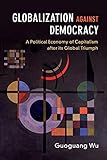Globalization against democracy : a political economy of capitalism after its global triumph
By: Wu, Guoguang
Publisher: [S.l.] : CAMBRIDGE UNIV PRESS, 2017.Description: 352 p. : 23 cm.ISBN: 9781316640753Subject(s): Capitalism | GlobalizationDDC classification: 330.122 WU GL Online resources: Location Map| Item type | Home library | Call number | Status | Date due | Barcode | Item holds |
|---|---|---|---|---|---|---|
| REGULAR | University of Wollongong in Dubai Main Collection | 330.122 WU GL (Browse shelf) | Available | T0056448 |
, Shelving location: Main Collection Close shelf browser

|

|

|

|

|

|

|
||
| 330.122 SW SO S.O.S. : | 330.122 UN DE Understanding capitalism : | 330.122 WO HO How will capitalism end? : | 330.122 WU GL Globalization against democracy : | 330.122019 AK AN Animal spirits : | 330.1220973 FO FR Freedom manifesto : | 330.1220973 GI MA The making of global capitalism : |
1. Introduction; 2. Capitalism in institutional reconfiguration by globalization: a theoretical framework; 3. Institutional oligopoly and embedded coordination: concentrative movements of capital; 4. Human (im)mobility, social poverty, and political inability: 'economic man' on the segmented labor market; 5. The shaping of the caged anarchy: standardized consumption, atomized consumers; 6. Global inequalities challenge democracy: sociopolitical impacts of transnational stratification; 7. Conclusion.
Globalization has reconfigured both the external institutional framework and the intrinsic operating mechanisms of capitalism. The global triumph of capitalism implies the embracing of the market by the state in all its variants, and that global capitalism is not confined to the shell of nation-state democracy. Guoguang Wu provides a theoretical framework of global capitalism for specialists in political economy, political science, economics and international relations, for graduate and undergraduate courses on globalization, capitalism, development and democracy, as well as for the public who are interested in globalization. Wu examines the new institutional features of global capitalism and how they reframe movements of capital, labor and consumption. He explores how globalization has created a chain of connection in which capital depends on effective authoritarianism, while democracy depends on capital. Ultimately, he argues that the emerging state-market nexus has fundamentally shaken the existing institutional systems, harming democracy in the process.
